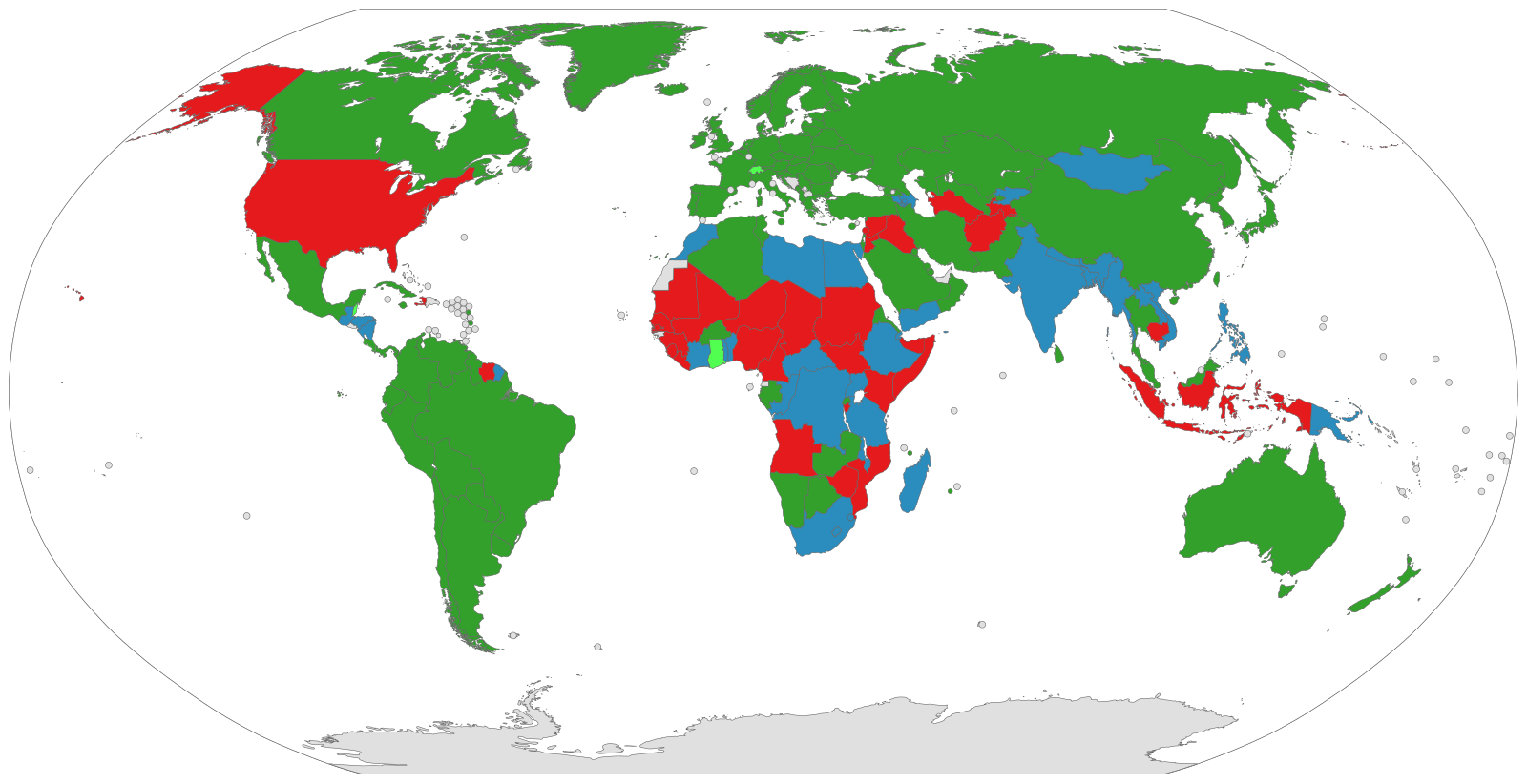Let’s assume we want all people to have health care. What are the steps / methods most likely to get us there?
In the U.S. seems like we’re a long way from that goal. I’m curious about chunking down the big goal into smaller steps. Interested to hear perspectives from other countries too.
The most plausible path forward would be to pass the 2023 Medicare for All act (introduced by US representatives Pramila Jayapal, Debbie Dingell, and Bernie Sanders).
I’d love to see this pass.
Here are links to see who has co-sponsored these bills: House / Senate
If your senator or legislator has not sponsored that could be one action - call or write them asking them to support the bill.
That said, I volunteered with a group for a few years trying to pass an unrelated bill at the state level, which in at least one session had more than 50% of the chamber co-sponsoring, but we still couldn’t get our bill out of committee. Eventually, the bill actually was voted out of committee, only to add amendments that made our bill do the opposite of what it was intended to, and then we had to rally votes against it. Eventually I moved and kind of dropped out of that organization, but the reform we support still has not been passed. And that was for a non-partisan issue.
I don’t know the methodology that govtrack uses, but they give the Medicare for All act a 0% chance of being enacted. So I’m interested in more ideas on the nuts and bolts of passing a bill like this.
I contacted my House rep. Thanks!
People need to vote.
If all the eligible people voted in the US, we could have universal healthcare in a year. Biden needs a super majority in both Houses.
That’s not how our democracy works unfortunately. We are a representative democracy, and regardless of the way the majority vote, our representatives can and do act against the general populace on a consistent basis.
You’re not wrong. At the same time, I’m looking for steps, specifics.
What are the odds people actually vote for it though? I’m of the impression that most Americans would rather to pay for healthcare than have it taken out of their taxes.
Move to Europe
Expand Medicare. It is already in place.
First you do Universal Pet Health, which you push by just talking about how good it would be for dogs and ranch families.
Then you talk about how silly it is that we have UPH, but not UBH, especially when UBH would help with our nation’s combat readiness.
What is the B in UBH?
Basic: we want to ensure everyone drinks pumpkin spice White Claws, has a pH of at least 7.1, or is basically healthy. Their choice.
Nah fuck that. Everyone benefits from universal human healthcare, but free vets overwhelmingly benefit wealthy and rural people.
Removing the 37 middle men between the docs and the patients would be a good start.
Some sort of strike. Either a general labor strike, or a debt strike. A general strike of laborers will be hard to organize, and there will always be scabs.
But a debt strike ia easier. Although I should probably say “Bill strike”. It goes like this: don’t pay four or five figure medical bills. Just put them in the shredder. If a significant portion of the population does this, it will force change. Just like the courts getting backed up because there were too many evictions, they will get backed up by all the wage garnishment cases that I’m sure someone is typing a reply about. If nobody pays, there isn’t much of a way to enforce it.
Take example from France’s social security system: https://en.wikipedia.org/wiki/Social_security_in_France
Gotta convince the voters around you. Talk to your coworkers, friends, etc. Be prepared to receive pushback, and a lot of ignorance, but occasionally, people that are trying to zoom out on the problems they’re seeing. I used to lean pretty right, but it wasn’t the Michael Moore types that brought me around; it was the Bertrand Russell types. People are plenty smart, but often need help connecting the dots. If you are condescending, you’ll get resistance. If you show them the right direction, they’ll find their own path, naturally.
It’s cheaper to have free health care than it is to have our current system and more productive for our country, so it’s really just a matter of following through on any of the public health care referendums.
What referendums are you referring to? In my state at least we don’t have the ballot initiative.
The Medicare for All act has been introduced multiple times since 2003 and is a great intermediary step to true comprehensive health care for all. Another comment linked to that above.
Ah, so a referendum is a direct vote by the population on a given issue - for example a lot of states have passed recreational marijuana referendums, in my opinion at least because a lot of lawmakers didn’t want to to be seen as supporting it, but you can’t get blamed if the public approved it directly.
I’m not aware of any state level referendums on universal healthcare (which doesn’t mean that there haven’t been any) and there isn’t a national level referendum. (Although in googling this to confirm that I found an interesting article about implementing a national referendum)
With the Medicare for All Act it’s been introduced as a bill, but as I understand the process it first needs to be reviewed by a committee and voted out of that committee before the senate or house can consider it to possibly hold a vote. Then it needs to do the same thing in the other chamber of congress. So you can imagine that’s a lot more convoluted process than a referendum, and while voters may ask their representative to pass it, plenty of opportunities for legislators to say, “oops, some technicality or person who’s not me has stalled the process.”
Oh I understand the confusion. That’s my bad, yes, the bills I’m referring to are not actually public referendums, I was using that word loosely.
Boy, I would prefer referendums on a lot of our public issues though.
You know I just found out today the Louisiana actually basically has referendum based elections?
In Louisiana, all the government candidates appear on the same ballot and if they win 50% plus one vote, then they win.
There’s a short majority runoff if it ties or if nobody gets 50%.
- Train a lot more doctors.
That is not the problem in this country keeping us from public health care. With the money we saved transitioning to public health care away from private health care, we could fund the tuition of as many doctors as we wanted.
It’s not tuition, but rather openings for students and residents. If you want more people to receive more health care, you need more doctor hours. Which means more doctors. Which means there need to be more spots in medical schools and residencies. These are currently scarce.
In the same way other public services are funded, fund the education of your medical professionals like they do in other countries, and you will have plenty of doctors.
Put the money saved by transitioning to public health care to good use.
Bipartisan collaboration for a public option that provides everything that the AMA says is necessary.
The biggest step is breaking the taboo on bipartisanism
In the U.S. seems like we’re a long way from that
Not just a long way. No visible way at all.
You need to fix your political landscape first, for example have > 2 parties, and have other than these two ultra conservative parties. Only then will you be able to make significant changes in your country.
deleted by creator
I don’t think you’re being serious, but the idea isn’t to give everyone worse care. If you talk to people from the UK, France, Spain, Germany, Australia, Canada, or any other country that has universal healthcare (all the green ones on this map) they would have plenty to say about things that could improve. You also wouldn’t find too many who would be willing to trade with the U.S.

Get all the people you want to have universal health care, to want universal health care. If you want it for them, sell it to them.
The only thing ever stopping any policy from existing is vote counts. Convince others that universal healthcare is in their best interests. If you’ve tried that and failed, take steps to improve your communication skill and try again.
A 57% majority of Americans say the government should ensure health coverage. Of course then 53% say the system should be based on private insurance, which is contradictory.
Another factor to consider here is people don’t vote directly for policies. They vote for legislators who then decide which policies are a priority, and can interpret for themselves, right or wrong, what it is their constituents voted them in to do.
Great! That means you haven’t reached 43% of Americans. Keep pushing, you can do it!




